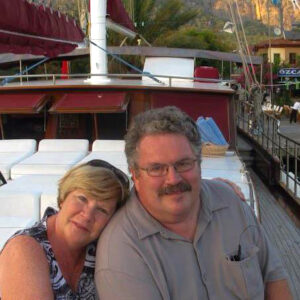Jim and Sherrie Starr
40 Years, 40 Stories

JIM AND SHERRIE STARR, NEW BERN
“We really tried to give the education piece of it equal billing. We were going for environmental awareness. We were really trying to understand when there were issues with the rivers and what they were.”
Jim and Sherrie Starr were drawn to New Bern by the prospect of sailing those wide, open waters. That was in 2005, but retirement didn’t last long after the couple became acquainted with neighbor — and then-Neuse Riverkeeper Foundation board president — Dave McCracken.
“He recruited me first to be a volunteer and then Sherrie got heavily involved with fundraising,” Jim said. “When I started as a volunteer, it was specifically to try to create a volunteer program that ended up being called ‘River Watch.’ That was all about getting members educated about what to look for when they were out on the river, for follow-up by the Riverkeepers or the state agencies to enforce environmental law.”
As Jim became more involved as a volunteer, then as a member of the NRF board, Sherrie leant her fundraising expertise to NRF’s cause.
“I had been involved in Denver in a lot of fundraising activities, so I volunteered,” she said.
In 2009, she joined the committee for Taste of Carolinas, at that time five years old and floundering.
“At that point, it was failing,” Sherrie said. “I thought, ‘This is a lot of work for $4,000, maybe we should do it differently.’”
The committee set about “tweaking” Taste, adding the chef’s competition, and the resulting reinvention of the signature NRF event was a success — almost too much of a success, according to Sherrie.
“In 2011, we had too many people. We were a victim of our own success,” she laughed.
More tweaking ensued, including making it a patrons-only event, which kept the numbers up to fundraising expectations, but down enough there were no lines and plenty of food.
“It was fun. It really was a fun group of people we were working with. It was so important for the organization, because it became our primary external fundraiser other than membership.
I was especially interested in the children’s education piece and being able to pay for that,” Sherrie said.
The education aspect was equally important to Jim.
“We really tried to give the education piece of it equal billing. We were going for environmental awareness. We were really trying to understand when there were issues with the rivers and what they were,” Jim said.
Under Jim’s watch as board president, NRF initiated education sessions where Riverkeepers did an overview of environmental law; NRF set up a mechanism for the public to report issues on or in the waterways; and a daylong symposium about fracking was organized at the North Carolina History Center at Tryon Palace.
“We had a whole discussion of the risks of fracking. That, I think, was another part of the public awareness piece that took a lot of work, and we had some controversy. We had pro-fracking and anti-fracking speakers and really tried to have a balanced view,” Jim said. “We advertised it, got it on NPR, and we got people who were concerned about the river, and we got people who thought all this stuff was a bunch of hooey, who wanted to hear what the issue was.”
Jim initially had reservations about the merger between Neuse Riverkeeper Foundation and Pamlico-Tar River Foundation, but by the time his presidency ended, two of oldest conservation organizations were poised to become Sound Rivers — “a very good thing,” he said.
The issues facing the rivers then are the same one facing the rivers today, Jim said: nutrient pollution, particularly caused by concentrated animal feeding operations (CAFOs) and stormwater runoff; fish kills due to algal blooms caused by both. He said his wish is that environmental law would be enforced to the point that Sound Rivers can focus solely on educating people about and advocating for the rivers.
“I used to say in the NRF, the NRF’s ultimate goal is not be in business,” Jim said.
